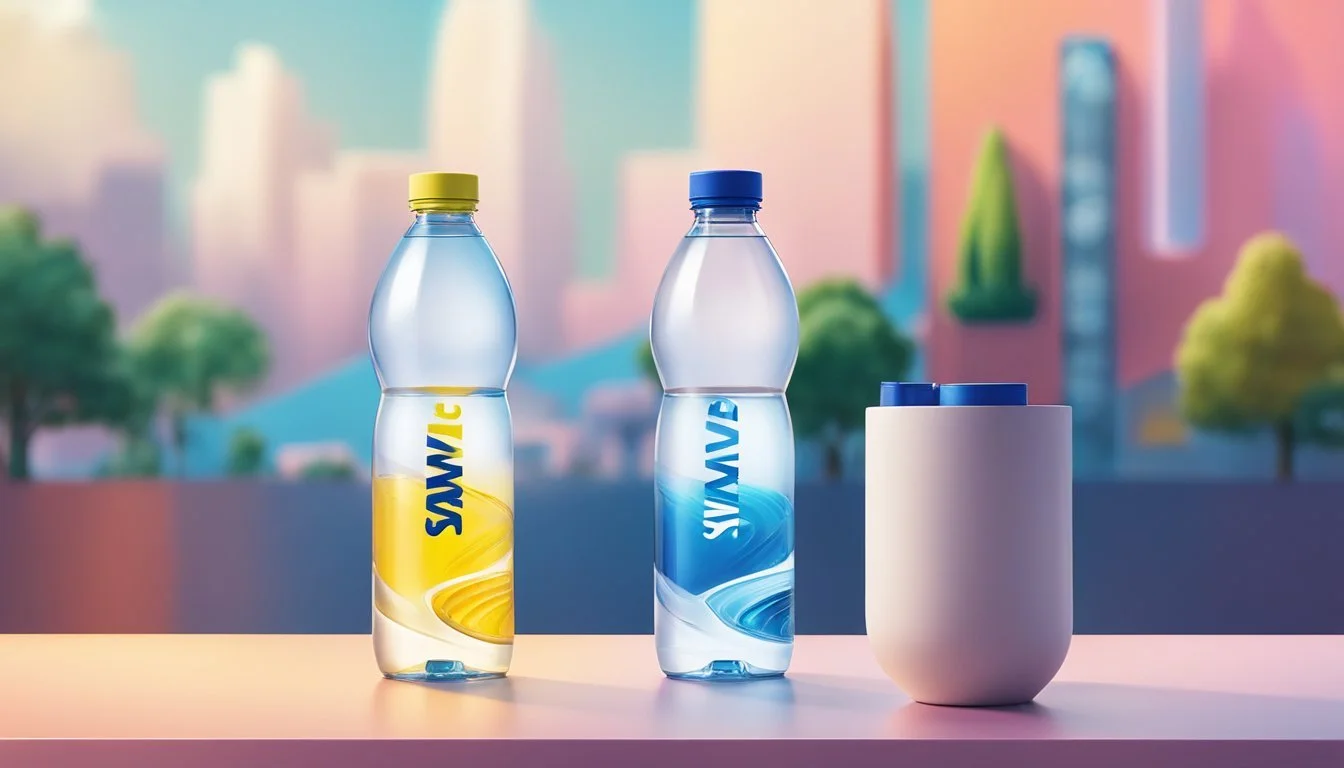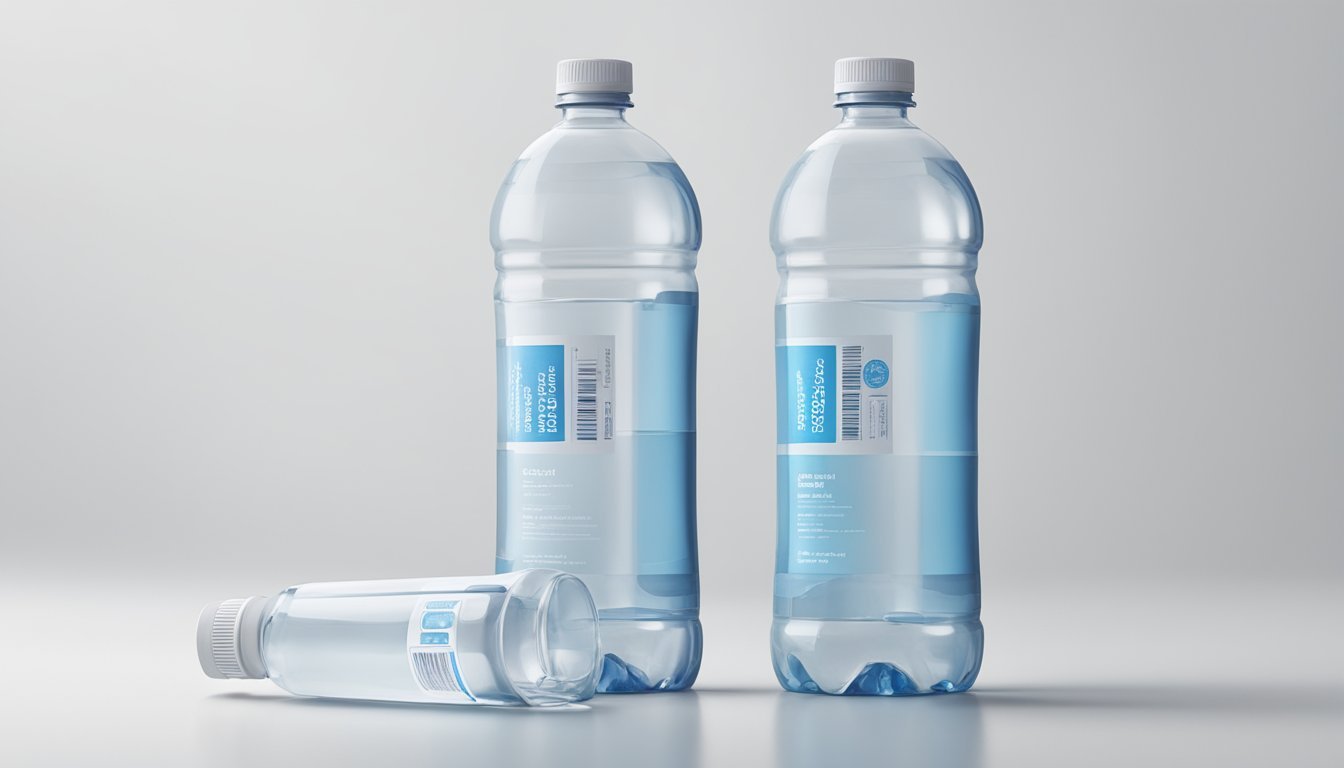Smartwater vs. Skyra
Which Bottled Water is Better for You?
Choosing the right bottled water can be surprisingly complex, with various factors such as taste, source, and mineral content playing significant roles. Smartwater, known for its sleek branding and vapor-distilled process, promises a clean, crisp taste with added electrolytes for enhanced hydration. It has become a favorite for many who appreciate its pure, reliable nature, free from overpowering flavors or noticeable aftertastes.
Skyra, on the other hand, positions itself as a premium mineral water sourced from Icelandic aquifers, boasting a bright, natural flavor complemented by its high mineral content. Packaged attractively and marketed as a luxury water, Skyra appeals to those who seek both taste and health benefits from their hydration choice.
Ultimately, the choice between Smartwater and Skyra depends on personal preference: if you prioritize a pure, distilled experience, Smartwater excels, while Skyra offers a rich, mineral-infused alternative for those who enjoy a more complex flavor profile. This head-to-head comparison will delve into the details, helping you make an informed decision about which bottled water best suits your needs.
Evaluating Water Quality
When comparing the quality of Smartwater and Skyra, important factors include pH levels, mineral content, the presence of contaminants or impurities, and taste profiles. Each of these aspects provides insight into the specific health benefits and purity standards of both bottled water brands.
Understanding pH Levels and Acidity
The pH level indicates the acidity or alkalinity of water, which influences its taste and potential health benefits. Smartwater typically has a neutral pH around 7, achieved through added electrolytes. Skyra, sourced from Icelandic glaciers, boasts a slightly alkaline pH of 8.88, which some consumers believe offers additional health benefits, such as reduced acid reflux and better hydration.
Monitoring pH levels helps ensure that the water maintains a balance that supports overall well-being without being too acidic or too alkaline.
Mineral Content and Health Benefits
Mineral content significantly affects the water's health benefits. Smartwater is infused with electrolytes like calcium, magnesium, and potassium. These added minerals are intended to enhance hydration and provide a clean, crisp taste.
In contrast, Skyra naturally contains calcium, magnesium, and potassium, sourced from ancient lava rock filtrates, promising natural mineral benefits. These minerals can contribute to daily nutritional requirements and potentially improve bone health, muscle function, and electrolyte balance.
Presence of Contaminants and Impurities
The purity of bottled water is paramount, and checking for contaminants and impurities is essential. Smartwater undergoes vapor distillation, which removes most impurities, ensuring a high purity level. Tests for heavy metals, BPAs, and PFAS chemicals typically show negligible levels in the final product, aligning with safety standards.
Skyra, sourced from glacial springs, emphasizes a natural filtration process through lava rock, which naturally filters out harmful substances. Routine testing ensures the absence of significant contaminants, maintaining its reputation for purity and safety.
Taste Profile Comparison
Taste is a crucial factor in bottled water selection. Smartwater, enhanced with electrolytes, offers a smooth, clean taste that many find refreshing. The added minerals create a distinct taste profile that stands out from typical tap water.
Skyra, with its higher alkalinity and natural mineral content, provides a crisp, refreshing taste that highlights its glacial origins. Its taste is often described as slightly sweet and smooth, appealing to those who prefer a more natural flavor profile.
Both Smartwater and Skyra cater to different taste preferences, influenced by their unique mineral compositions and purification processes.
Environmental Impact and Sustainability
The production and disposal of bottled water have significant implications for the environment. This section will explore the effects of bottle production, water sourcing, and the specific environmental initiatives of Smartwater and Skyra.
Bottle Production and Plastic Use
Smartwater primarily uses plastic bottles, which contribute to plastic waste and environmental issues. Skyra, on the other hand, offers both plastic and glass bottles. Glass bottles, while heavier and more resource-intensive to transport, are more sustainable as they are reusable and recyclable.
Plastic waste from discarded bottles often ends up in oceans and landfills, causing harm to wildlife and ecosystems. The production process for plastic bottles also consumes substantial amounts of energy and fossil fuels, adding to their environmental footprint.
Water Source and Ecosystem Conservation
Smartwater sources its water from municipal supplies, which undergoes vapor distillation. This method does impact the immediate natural environment less directly. However, the resources used for distillation and transportation still pose concerns.
Skyra sources its water from an Icelandic underground spring. Sourcing water from an aquifer or mountain spring like Skyra’s can be more sustainable if done responsibly, avoiding over-extraction that could deplete the water table and harm the local ecosystem. The purity of spring water also reduces the need for extensive processing.
Brands' Environmental Initiatives
Smartwater has initiated several steps to minimize environmental impact, including the use of recycled plastic in their bottles and efforts to improve water-use efficiency. Their move towards plant-based plastic and lightweight bottle designs are part of broader sustainability goals.
Skyra emphasizes its commitment to sustainability through eco-friendly packaging and reduced carbon footprints in its manufacturing and distribution processes. They focus on preserving natural resources, ensuring their spring water source is used responsibly. Their use of glass bottles highlights a shift towards reducing plastic waste and promoting recyclability.
Each brand showcases different strengths in sustainability, aiming to lessen their environmental impact through innovative practices and responsible water sourcing.
Manufacturing Processes
Smartwater and Skyra utilize stringent manufacturing processes to ensure their bottled water meets high standards. These processes include advanced purification techniques, the careful addition of minerals and electrolytes, and rigorous quality checks complying with FDA regulations.
Distillation and Purification Techniques
Smartwater employs a vapor-distillation method, effectively removing impurities found in standard tap water. This process mimics the hydrological cycle, turning water into vapor and then condensing it, resulting in pure distilled water.
Skyra utilizes an extensive reverse osmosis filtration system that eliminates contaminants by pushing water through a semipermeable membrane. This method targets harmful substances and purifies the water.
Both brands prioritize purity, yet their approaches—vapor-distilled for Smartwater and reverse osmosis for Skyra—differentiate their final products' taste and mineral content.
Enhancement with Electrolytes and Minerals
Smartwater enriches its distilled water with calcium chloride, magnesium chloride, and potassium bicarbonate. These electrolytes enhance taste and provide additional hydration benefits, making the water not only pure but also refreshing.
Skyra adds naturally occurring minerals and electrolytes from its source. The water already contains crucial minerals, elevating its pH level, which some consumers find beneficial for hydration.
The specific minerals each company adds highlight their unique product positioning: Smartwater focuses on purity and added minerals, while Skyra emphasizes natural mineral content.
Bottling and Packaging Methods
Smartwater’s bottling process emphasizes transparency and eco-friendliness. Their bottles are BPA-free and recyclable, aligning with growing demands for environmentally conscious packaging.
Skyra also ensures its packaging meets high standards. The brand opts for eco-friendly bottles, aiming to reduce environmental impact while maintaining product integrity.
Both brands' attention to their bottling methods underscores their commitment to sustainability and consumer safety, reflecting their market priorities.
Quality Assurance and FDA Regulations
Quality assurance protocols for Smartwater and Skyra comply with FDA regulations to guarantee safety and quality.
Smartwater implements multiple checkpoints during manufacturing to ensure consistency and purity, adhering to all relevant FDA guidelines for bottled water.
Skyra follows a similar rigorous quality assurance process, ensuring their water meets both national and international standards.
These measures underscore both brands' dedication to delivering high-quality bottled water that consumers can trust.
Brand Analysis
Smartwater and Skyra are two well-known bottled water brands, each with its distinct attributes and market strategies. This section delves into their market positions and unique brand profiles, providing a comprehensive comparison to help consumers make informed decisions.
Market Position and Popularity
Smartwater, a product of Coca-Cola, enjoys high visibility and popularity. It's positioned as a premium bottled water, appealing to consumers through its vapor-distilled purification process and added electrolytes for taste. The brand’s strong marketing campaigns and widespread availability contribute to its prominent market presence.
Skyra, sourced from Icelandic springs, targets health-conscious consumers seeking natural hydration. Known for its high pH level and electrolytes, Skyra carves a niche in the premium bottled water sector. Although not as ubiquitous as Smartwater, it has a growing customer base attracted by its purity and the pristine source of its water.
Comparison of Smartwater and Skyra's Brand Profiles
Smartwater emphasizes innovation and purification. It undergoes a vapor-distillation process, mimicking nature’s hydrological cycle, which sets it apart from competitors like Dasani and Aquafina. Celebrities often endorse Smartwater, reinforcing its premium status. The brand’s sleek packaging and the association with health and wellness contribute to its strong appeal.
Skyra prides itself on its natural origin and mineral-rich composition. Sourced from untouched Icelandic terrain, it’s naturally filtered through volcanic rocks. Skyra highlights its high pH value and balanced mineral content, making it appealing to those looking for alkaline water options. The minimalist design and emphasis on sustainability and purity give Skyra a competitive edge in the premium segment.
Together, these elements underline the unique qualities and market strategies of Smartwater and Skyra, offering consumers distinct benefits based on their preferences and priorities.
Health and Nutrition Factors
Smartwater and Skyra both offer distinct health and nutrition benefits, making each appealing to different preferences and needs. Key aspects explored include hydration efficiency, nutrient additives, and comparisons to sports drinks.
Hydration Efficiency
Smartwater is known for its vapor-distilled process, which mimics the hydrological cycle. This results in pure water, free of impurities. Electrolytes like potassium, calcium, and magnesium are added to enhance flavor and hydration. The pH level of Smartwater is typically neutral to slightly alkaline, which may aid in maintaining the body’s natural balance.
Skyra, from Iceland, boasts a naturally high pH level around 8.88, which can promote more effective hydration. Its higher mineral content, including calcium and magnesium, supports overall hydration and may improve athletic performance. This makes Skyra particularly attractive for those looking for a hydration boost with additional benefits from naturally occurring electrolytes.
Nutrient Additives and Their Effects
Smartwater and Skyra both include beneficial additives. Smartwater’s supplemented electrolytes aid in hydration and flavor without adding calories, making it a favorable choice for those conscious about their intake.
Smartwater Additives:
Electrolytes: Potassium, calcium, magnesium.
Effects: Improved hydration, better taste.
Skyra emphasizes its naturally sourced minerals and alkaline pH. These elements contribute to hydration and may aid in neutralizing acidity in the body. The high pH level is associated with better hydration efficiency, which can be especially beneficial for athletes or those with high physical activity levels.
Skyra Additives:
Natural Minerals: Calcium, magnesium.
Benefits: Enhanced hydration, potential acid neutralization.
Comparison to Sports Drinks
When comparing Smartwater and Skyra to sports drinks like Gatorade, several factors stand out. Sports drinks often contain sugars and additives to boost energy and replace lost electrolytes during intense physical activity. These additional calories can be a drawback for those not needing the extra energy.
Smartwater offers a low-calorie alternative, providing electrolyte benefits without added sugars.
Skyra, with its high mineral content and alkaline pH, serves as a hydrating option with natural benefits, without the caloric impact of traditional sports drinks.
Comparative Table:
Product Calories Electrolytes Added Sugars pH Level Smartwater 0 Potassium, Calcium, Magnesium No Neutral Skyra 0 Calcium, Magnesium No Alkaline Gatorade ~80 Sodium, Potassium Yes Acidic/Neutral
This contrast shows that Smartwater and Skyra are superior options for hydration without the extra calories and sugars found in sports drinks.
Consumer Considerations
When deciding between Smartwater and Skyra, several factors come into play. Taste, convenience, and cost are crucial elements that can influence a consumer's choice.
Taste Preferences and Perceived Value
Taste is subjective and varies from person to person. Smartwater is known for its crisp, clean taste due to its vapor-distillation process. This process is designed to replicate the hydrological cycle, resulting in water that is pure and refreshing. Some might find it lacking in mineral flavor compared to more mineral-rich waters like Evian or Pellegrino.
Skyra, on the other hand, has a unique taste owing to its high pH level and added electrolytes. These attributes can make it taste slightly different and potentially more soothing for those who prefer alkaline water. For consumers focused on hydration benefits, Skyra’s high electrolyte content might add perceived value to their beverage consumption experience.
Convenience and Accessibility
Convenience plays a significant role in a consumer’s decision-making process. Smartwater is widely available in grocery stores, convenience stores, and vending machines, making it a convenient choice for many. Its recognizable branding and consistent availability mean that consumers don’t have to go out of their way to find it.
Skyra is growing in popularity but may not be as widely available as Smartwater. It might require a visit to specialty stores or online ordering, depending on the area. For those prioritizing convenience and immediate accessibility, this could be a drawback. However, dedicated consumers might appreciate Skyra's unique composition enough to seek it out.
Cost and Budget Factors
Cost is always a consideration. Smartwater tends to be moderately priced, making it accessible for regular purchase without straining the budget. It is often found in a range of sizes, providing options for different needs and price points.
Skyra, containing added benefits like higher pH and electrolytes, may come with a slightly higher price tag. This could be a factor for budget-conscious consumers who are comparing it against other premium bottled waters like Nestlé Pure Life or Evian. While the benefits might justify the cost for some, others may prefer more economical choices.
By considering these specific aspects, consumers can make an informed decision between Smartwater and Skyra based on their individual preferences and priorities.
Technical Specifications
Smartwater and Skyra are two popular bottled water brands that boast unique features. This section breaks down their pH levels and alkalinity, mineralization process, and filtration and purification methods.
pH Levels and Alkalinity
Smartwater offers a version called Smartwater Alkaline, which has a higher pH level compared to regular Smartwater. The regular version is typically vapor-distilled with a neutral pH around 7, whereas the alkaline version is usually around 9.
Skyra, known for its Icelandic origin, generally maintains a pH level closer to neutral yet slightly alkaline, often around 8-8.5. This nature of the water can be more appealing to those seeking pH balance in their hydration routine.
Mineralization Process
Smartwater uses a process where vapor-distilled water is remineralized with electrolytes like calcium, magnesium, and potassium. These added minerals enhance the taste without significantly altering the water's purity or clarity.
Skyra's mineral content is natural, originating from Icelandic glacial sources. The water is naturally filtered through ancient lava rocks, which naturally infuses essential minerals. The typical minerals present include calcium, magnesium, and silica.
Filtration and Purification Methods
Smartwater goes through a thorough vapor-distillation process. This method involves heating water to a vapor state to remove impurities, then condensing it back into liquid form. The result is ultra-pure water that's then enhanced with electrolytes for taste.
Skyra employs a natural filtration system, harnessing the power of Icelandic glacial waters. The water passes through layers of volcanic rock, naturally filtering impurities while preserving the mineral content. There is no additional enhancement or ionization, focusing on maintaining the water's natural purity.
In summary, the technical specifics of Smartwater and Skyra highlight key differences in their approach to hydration, filtration, and mineral content, offering a compelling choice based on individual preferences for purity and taste.





